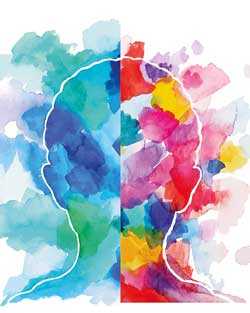Friday Feb 27, 2026
Friday Feb 27, 2026
Monday, 3 June 2019 00:00 - - {{hitsCtrl.values.hits}}
A few weeks after the deadly terrorist attacks on Easter Sunday, life is still a long way from returning to normal. Living in the digital age, social media and messaging apps like Facebook, Instagram or Whatsapp will not let us move on. With constant updates on the Government’s investigations into the attacks along with the viral circulation of gruesome CCTV footage and pictures, people are being subjected to a constant information overload.

This has ultimately distorted our view of the mundane and heightened our sense of terror; a lorry parked outside an apartment complex or even individuals carrying backpacks induce suspicion and stress. Meanwhile, the loved ones of those killed and injured are still grieving and the rest of us are drowning in a whirlpool of paranoia.
Healthy Life Clinic, a health establishment in Colombo reputed for providing family health solutions, comprehensive diabetes care and corporate health and wellness programs, has led the way in offering mental support services to those directly and indirectly affected by the attacks. Here, they mainly focus on those who may have fallen through the cracks of the typical support systems at work or home.
These may include first responders to the scene like security forces, medical professionals, firefighters, individuals exposed to and affected by the devastation through news channels and conversation or even those tasked with clearing up the debris at the site.
Healthy Life Clinic’s Chief Consultant and founder Dr. Kayathri Periasamy said that the initial phase of shock and denial has come to an end but people are still grieving. “We as people have begun to re-evaluate how we do things and in many cases, our belief systems. An existential dilemma is governing some people’s minds as to why it happened in places of worship and the purpose of life itself,” said Dr. Periasamy. However, while most people go through the five stages of grief - denial, anger, bargaining, depression and acceptance – with little to no help, there is a group of individuals who cannot move past tragedy as quickly as others. Dr. Perisamy discussed the three unique ways these mental boulders can present themselves to people. 1. Psychosomatic illnesses: Physical illnesses caused or aggravated by mental factors such as internal conflict or stress, e.g. sudden complains of high blood pressure, eczema, ulcers within communities.
2. Drug or alcohol addictions: Unable to cope with the emotional pain and stress, many seek peace through excessive liquor or drug consumption. It might seem like a temporary release but if you couple this with unresolved issues of internal conflict, people end up in a worse state than they started off in.
3. Post Traumatic Stress Disorder (PTSD): A condition that can develop in individuals post-trauma who experience intense disturbing thoughts and feelings long after the incident, relive the event through flashbacks or nightmares, experience heaviness, sadness, fear or anger, detach themselves from social settings, and avoid places or situations reminiscent of the event (even something as simple as a loud noise).
Healthy Life Clinic encourages all who might be experiencing these symptoms to seek support. Given that mental health is a topic in Sri Lanka that is only beginning to lose the negative stigma attached to it, it is vital that all individuals are encouraged to come forward to seek the right kind of help.
The Consulting Business Psychologist at Healthy Life Clinic, Rozaine Cooray, also spoke about seven simple coping mechanisms people could follow after an incident like the Easter bombings until they decide to seek the support of a professional counsellor.
1. Breathe, pray and meditate. Join a volunteer group to help and rebuild; anything that lends meaning to your life.
2. Avoid being overexposed to the news and ensure the credibility of your news sources to avoid unnecessary terror or stress.
3. Try to avoid reliving these incidents with others, instead engage in purposeful, mood-lifting conversations. Find resources that can give you inspiration - a book or a video clip.
4. Learn what local resources are available to support those affected by the tragedy and share this information.
5. If you are feeling anxious, angry or depressed, know that you are not alone. Open up to trustworthy, sensitive friends or family about how you feel rather than the event itself.
6. If you have children, have open dialogues with them about their fears as a family without trivialising situations.
7. Feelings of anxiety and depression following a traumatic event are common and natural. If symptoms continue for a prolonged period, even after the order has been restored, or if these feelings begin to overwhelm you or affect your sleep/diet and overall functionality, seek the advice of a mental health professional in your community.
In this regard, Healthy Life Clinic offers both personal and group counselling for families; debrief sessions for employees in groups in which they are encouraged to speak about their emotions immediately after a crisis and informed of the natural human response to crisis; and training for HR officials in grievance handling, basic counselling and psychological first aid and referrals.
Dr. Periasamy asserted: “In these desperate times, it is often easy to overlook the needs of our mind and soul and focus entirely on the physical until we look for an easy way out when we can’t ignore the mental pain anymore. Most need a reinjection of purpose and hope. It is never too early to ask someone to take professional precautions and never too late to do it either.”
For anyone who would like to receive professional counselling, Healthy Life Clinic can be reached on 0773511511.